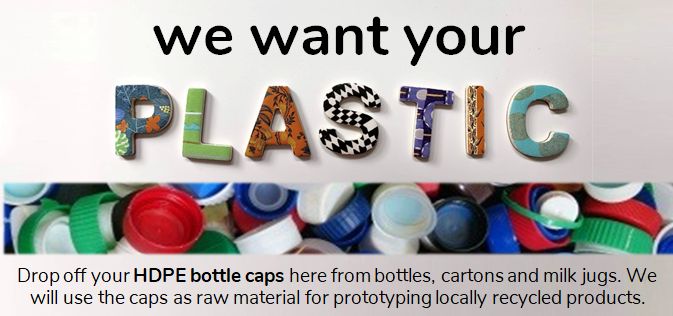Stop! Don’t throw away your plastic bottle and drink carton caps! We’ve got a plan to put them to good use!
Precious Plastic Dublin wants to give them a new life by shredding, melting and remoulding them into new, long-lasting products such as bowls, flower pots, clipboards, coasters and much, much more.
Where to send the caps?
Please send all caps to: Precious Plastic Dublin @ Ballymun Youthreach Beside Library, Ballymun Road, Dublin 11.
Why the caps?
Billions of plastic bottles and drink cartons are sold and opened every day. While the bottles are mainly made from PET plastic and the drink cartons from a mix of plastic, metal and paper, most of the caps are made from HDPE (High-Density Polyethylene), a really strong, lightweight and waterproof polymer. We can use this HDPE to make new and long-lasting products right here in Dublin and demonstrate that there is immense value in waste plastic.
The rings as well?
Yes, you can also send us the rings from the bottles as they are also made from HDPE.
Binning your bottles: Caps on or off?
In Ireland, there’s often contradictory information found on the internet or from waste management companies about whether or not bottle caps should be kept on the bottle or removed from it before placing both into the recycling bins. In the past, the plastics recycling industry wasn’t able to effectively recycle bottles with caps on so they requested that consumers remove the caps. These days waste management companies often want to make it easy for the consumer so they don’t specify if the caps should stay on or come off. It might actually happen that the bottle caps are separated and sorted out at a waste management facility, but this isn’t guaranteed. While recycling collection and processing technology has definitely improved over the years, demand for recycled material is still low. It’s all a bit confusing…
Are caps part of the global plastic problem?
It’s been shown that the relatively small caps can easily leak into the environment causing harm to nature and us humans. They’re especially dangerous for birds and marine life as mammals, birds and fish might mistake plastic pieces as food, and ingest them with potentially fatal consequences. HDPE caps are made of hard plastics that degrade very slowly in seawater. The caps are among the top five items found during beach clean-ups and beach litter monitoring programmes around the world. Over the last 30 years, more than 20 million bottle caps and lids were found during beach cleaning activities worldwide. Currently, it’s unknown how many bottle caps actually enter our oceans and wash up onshore. Next time just look around Dublin’s streets or a local beach near you and check how many of the small caps you can spot
Are all caps made of HDPE?
Not necessarily, but the vast majority of them are. Unfortunately, current European legislation doesn’t make it mandatory to print resin codes on caps (resin codes are the small numbers from 1 to 7 that specify the type of plastic a product is made of). According to a Dutch study looking at 1000 caps collected at beach clean-ups, 71% had no resin code and 23% had code 2 (HDPE). Of the remaining caps with legible recycle codes, fewer than 1% had code 3, 1% had code 4 and 1% had code 5, which are all different types of plastic polymers (or resins).
What about tethered caps?
In California, all retailers will be prohibited from selling single-use drinks bottles without a tethered cap from 2020 onwards, ensuring that bottle caps don’t get separated from the bottles. In the European Single Use Plastics Directive it’s stated that “beverage containers that are single-use plastic products should only be allowed to be placed on the market if they fulfil specific product design requirements that significantly reduce the dispersal into the environment of beverage container caps and lids made of plastic.” So, there might be hope. However, moving away from single-use plastic bottles would be the best and most efficient solution to ensure that such bottle caps won’t enter our environment.
Is recycling really the solution?
No, absolutely not! The Precious Plastic Dublin team is aware that we can’t recycle ourselves out of this plastic crisis. Existing solutions and market incentives simply do not scale, as we have clearly seen within the last decade. We encourage everyone to start using a reusable water bottle to reduce the amount of plastic waste you create. Here is a map where you can refill your water bottle in Dublin. Look out for alternatives, such as milk and juices in glass bottles, etc. Feel free to talk to your local supermarket or contact the producer directly. Only if we make ourselves and our preferences as a sustainable consumer known, will we be able to initiate change.
Here’s an extra tip for you if you’re a fan of plant based mylk but you want to avoid drink cartons; you can easily make it at home. Check out this youtube video:
